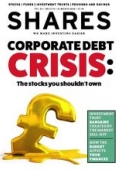At the worst point on Monday 9 March, the FTSE 100 traded 8.4% lower, recording its fourth biggest one-day drop on record. Only two days during the 1987 crash (12.2% and 10.8%) and in the 2008 global financial crisis (8.8%) were worse.
The oil sector bore the brunt of the latest sell-off with an estimated £61.5bn wiped off UK oil stocks, with Premier Oil (PMO) and Tullow Oil (TLW) seeing the biggest percentage drops, off 54% and 29% respectively.
The following day (10 March) saw the oil price rebound by 8% to $37.15 per barrel, gold slip back in value after briefing touching $1,700 per ounce a day earlier, and most stock markets around the world tried their best at starting a recovery rally.
Despite the doom and gloom, a few stocks stand out from the crowd. With the media highlighting shortages of toilet paper and hand sanitisers in the shops as people panic-buy, shares in toilet roll manufacturer Accrol (ACRL:AIM) have risen by 12% so far in March.

One stock which had bucked market weakness in February was funeral company Dignity (DTY) as investors predicted a potential upturn in demand as a result of coronavirus increasing the death toll in the UK. However, the shares slumped on 11 March amid disappointing results.
Economists have been studying past health epidemics like SARS and Ebola to help guide possible scenarios for the current outbreak of coronavirus, although the current epidemic is slightly different and seems to have engendered more public concern globally.
In the past, once the virus was contained there was a tendency for economic activity to bounce back quickly, leading to what economists call a v-shaped recovery.
Analysts at banking group ING point out that unlike past events, today there is the potential for both a supply and demand shock. Supplies have been disrupted by factory closures while fewer trips to the shops and restaurants mean a hit to consumer spending.
Targeted fiscal support like the income tax forbearance suggested by US president Donald Trump and suspension of mortgage payments as put forward by the Italian authorities can help mitigate some of the financial effects.
Meanwhile banks are more capitalised than ever, enabling them to deploy emergency cash flow funding in specific sectors. All this suggests the most likely worse-case scenario is a sharp, short recession, according to ING.
‹ Previous2020-03-12Next ›

 magazine
magazine









